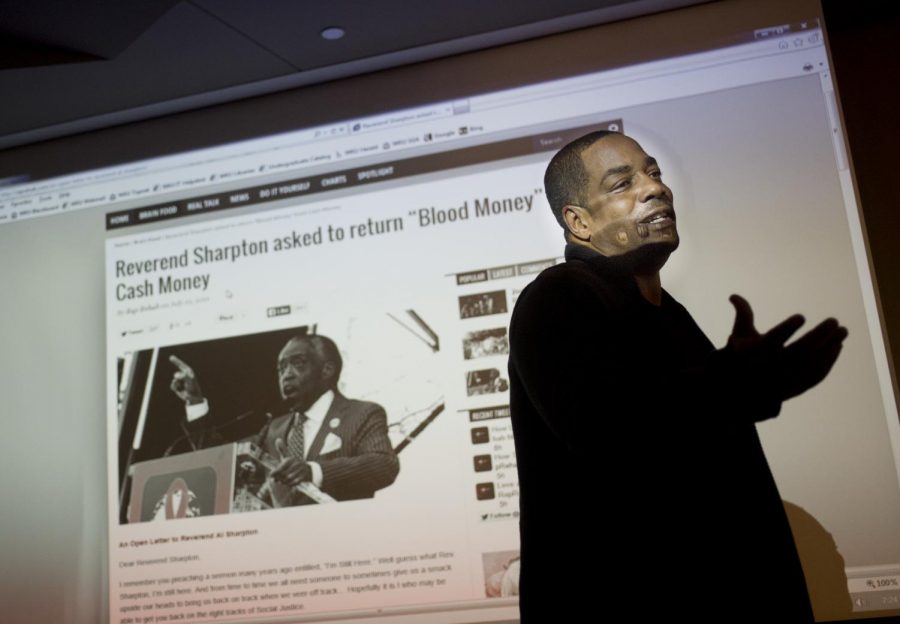Founder of RapRehab.com gives lecture on diversity
February 11, 2014
WKU prides itself on being a diverse campus that is home to many different races, religions and cultures. This year, the Office of Institutional Diversity and Inclusion is celebrating that diversity in a number of ways for Black History Month.
On Thursday, entertainment personality and businessman, Paul Porter, became part of WKU’s month-long celebrations.
Porter spoke in the Gary Ransdell Hall Auditorium about his life as well as the changing face of media. The interactive discussion was called “Connecting the Dots: Black Media and the Civil Rights Era and Distortions of Main Stream Media.”
Porter touts an extensive list of credentials and accomplishments. Not only is he the CEO and Founder of Raprehab.com, an online site dedicated to music, culture and unbiased news dissemination, but he has also been the program director and talent for BET, a consultant for AOL Music, and worked for the NBA and Sound Exchange. Andrea Garr-Barnes, the director of the Office of Institutional Diversity and Inclusion, coordinated the event and said Porter knows how to have an interactive conversation.
“I chose to have Paul speak because I had become familiar with his work,” she said. “I thought that he had a voice that students can identify with. He doesn’t try to be hip or cool. He isn’t talking at the students, but he is talking with them.”
Porter started off the evening by encouraging students to take advantage of the opportunities they are presented with in college.
“You have to remember that what you do for the next five to ten years is really going to shape your life,” Porter said to the group.
Porter spoke about how he got his start in college radio when he was working just to get his voice out there and spread his message.
“If you have the right message, people will listen,” Porter said. “Growing that message to other people is where it gets hard.”
Garr-Barnes hoped to encourage students to realize that they have the power to make changes and share their voices too.
“I want the students to understand that each of us has power,” she said. “We have the power to do so much more than just not watch or listen to something. We have the power to change it. We are educated people, and we can come together collectively.”
Porter, stereotypes said passed down through generations, and there are a lot of support groups to help deal with them.
“There are always going to be different opinions,” he said. “But I feel sad for them, they are undereducated. There is no excuse to be misinformed, there are so many ways to get information.”
Porter went on to talk about how it is important to not just go with the status quo, but to speak up.
He explained when he switched from being an observer to an activist.
A song by Rah Digga entitled “Party and Bullshit,” released in 2003, began its second verse with the lyrics, “I beat that bitch with a bat.” Porter said a 12-year-old girl asked him to stop the song from playing on the radio because it was the exact situation she was experiencing at home. Porter was able to get the song off the radio for the girl.
“Sometimes you’ve got to put people in check,” he said. “I question everything that I hear and everything that I see.”
Porter encouraged students to get their voices out there and start a blog or create a website.
“Really spend some time with yourself, and think about what you’re going to carve out,” he said.
Hannah Roberts, a freshman from Trimble County, said she joined the audience because she is from a town that isn’t very diverse.
“I came from a small town that was mainly white,” she said. “I wanted a perspective on African-American culture and to learn how to voice my opinions.”
Porter explained to the audience that it is important to increase the amount of news they read so that they can develop a sensitivity to news production and become better informed.
“If we are getting our news from Facebook and Twitter alone then it is going to be bad in the future,” he said.
Porter tied news transmission to the music industry, and said that the media platforms have suffered from a lack of diversity over the past few years.
“It’s not really about censorship. It’s about balance,” he said.
According to Porter, stereotypes in the news are more than just black and white.
“It is so much bigger than race,” Porter said. “There needs to be some unity.”
Wrapping up, Porter reminded the audience to be careful of its digital footprint.
“So many people don’t take active roles with the opportunities they are given,” he said. “The sort of participation you have is what sets you apart.
“Seeing that someone has an opinion is better than reading a resume,” he said. “It’s really easy to go through life only being a fraction of yourself.”






















![Megan Inman of Tennessee cries after embracing Drag performer and transgender advocate Jasmine St. James at the 9th Annual WKU Housing and Residence Life Drag Show at Knicely Conference Center on April 4, 2024. “[The community] was so warm and welcoming when I came out, if it wasn’t for the queens I wouldn’t be here,” Inman said.](https://wkuherald.com/wp-content/uploads/2024/04/smith_von_drag_3-600x419.jpg)


